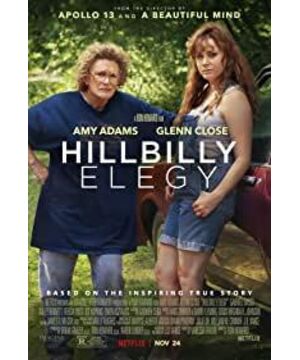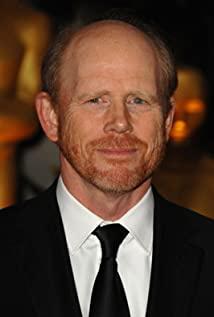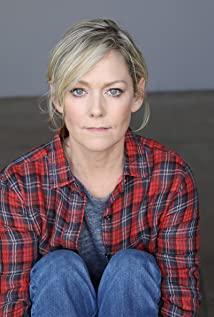The film has been discussed for its political or opinion purpose in the memoir itself. I reposted two New York Magazine articles, the first on why books and movies have a right-wing political purpose, and the second on Amy Adams' not-so-great, obnoxious, and boring performance in movies , The author analyzes from the perspective of AA fans for many years why Oscar should not feel that it is the right time to give AA an Oscar because of this movie.
After reading some other film reviews, generally speaking, this film and this book are very controversial in the critics, and the specific way of being controversial is generally negative reviews. There is a lot of discussion on JD Vance's own values and motivations. Motivational disputes include, for example, that Vance's wife once served for Kavannaugh, who was a conservative because of sexual assault and lack of common sense of the Constitution, and Vance's popularity in the Republican political circle before and after the book was published. A twisted propaganda of the belt; (hence) the condescending attitude of many critics to criticize the film.
reproduced.
https://nymag.com/intelligencer/article/who-is-netflixs-hillbilly-elegy-for.html
By Sarah Jones
Five minutes into Hillbilly Elegy, I hit pause and walked out of my living room. In the relative safety of my bedroom, I stared at the wall and then at the ceiling; both suddenly appeared preferable to my television . Hillbilly Elegyisnot a subtle film. It tells us early how it intends to go about things. The camera pans out to show broken-down houses and rusted-out trucks in what is supposed to be Eastern Kentucky. There are men without shirts and men with long white beards doing manly things on the side of a country road. This is a holler, according to director Ron Howard, and nothing good could happen next. But I'm not a coward. I returned to the movie. I looked for the “ holler aunt,” a creature I learned of not through my own Appalachian upbringing — which was mostly dull — but through thecast ing announcements for this film. Where was the holler aunt? What distinguishes her from other varieties of aunt, and how would I recognize her ?
Reader, I cannot tell you anything about the holler aunt. Like the mythical Sasquatch, she eludes me. On the subject of Hillbilly Elegyi tself, however, I have much more to say — and none of it is positive.
But first I must admit that I did not expect to like this movie, and I have resented Netflix for midwifing it into being. My antipathy for its source material — JD Vance's 2016 memoir of the same name — is by now well-established. As Iw roteat the time of its release, the book is poverty porn wrapped in a right-wing message about the cultural pathologies of the region. In Vance's Appalachia, poverty and immorality intertwine. Success happens to hard-working people, and structural explanations for poverty receive glancing attention when he chooses to mention them at all. Vance, meanwhile, is a hero by virtue of his escape. The deceased do not give elegies for themselves. Survivors do that. And so Vance can speak for the hillbilly because he no longer is one; because he went to Yale, the stereotype of the uncouth white reprobate no longer applies.
His flattened-out view of the hill country appeals to many — obviously — though, in Appalachia itself, E legyr eceived a decidedly unenthusiastic reception. Local activists and scholars alike havewr itten bo o ksin response to Elegy and i ts. “For Vance, the historian Elizabeth Catte wrote in her 2017 book, What You Are Getting Wrong About Appalachia, the region's “only salvation is complete moral re-alignment, coupled with the recognition that we should prioritize the economic investments of our social betters once more within the region.” Vance's invitation to the 2018 Appalachian Studies Association even sparkeda protes t.
But there was always a possibility, however slim, that Ron Howard and Vanessa Taylor (the woman who co - wrote The Shape of Water) , might improve on Vance's ham-fisted project. Alas. A year after Bong Joon-ho'sPa rasiteto ok home the award for Best Picture, Netflix and Howard have taken up the class-war theme and given it the Gree n Book tre a tment. Elegy thus belongs to an old and ignoble genre, one which caricatures the hillbilly for an audience's titillation.
In film, television, and comics, the hillbilly is either a villain or an exotic: congenitally violent, almost subhuman, sometimes even supernatural. Everyone knows D aliverance, with its twisted backwoods rapists. But there's also 6 Souls, a lamentable 2013 horror movie starring Julianne Moore, in which the hollers hold real witches and their powerful curses reach far beyond the hills. The USA network put its own spin on the genre with its Out sidersseri es, revolving around a hill clan so isolated they still speak a Celtic language and make magical moonshine that turns people violent. InNell, the1994 film starring Jodie Foster, the lonely North Carolina high country nearly turns a woman feral; her idiosyncratic language is barely recognizable as English. The subjects of hillbilly movies have served a consistent function over time. Whites “who simultaneously occupied a heroic past and a degraded present” were useful to social elites, and the pop-culture portrayal could “both uphold the superiority of modern civilization and provide exhilarating scenes of murder and mayhem that did not threaten the 'proper' social and racial order,” wrote Anthony Harkins in Hillbi lly: An American Icon.
SoE legyi sn't meant for the people of Appalachia, or the Ozarks, or the Rust Belt. No hillbilly film is ever made for the people it depicts. They're intended for people with power and security, people who want to believe that money is the same thing as integrity or intelligence and that, conversely, an absence of money indicates something about a person's character. Viewers want to look at the hillbilly and reassure themselves they are not that. After all, they'd vote for Obama a third time if they could. Located beyond the reach of reason or society, the hillbilly is pure white id. He's also a fiction. In reality, the trappings of civilization do not purify a soul. You cannot tell a good white person from a bad white person by the way someone dresses — or how they sound when they speak.
A movie about poor people of Appalachian extraction does not have to be a hillbilly film. But Vance's decision to provide an exhilarating portrait of a dysfunctional culture leavesE legyt he movie nowhere interesting to go.El egyisentirely true to Vance's book, which is the worst thing I could say about it. Glenn Close plays Mamaw, lurching around in Warby Parker spectacles and oversized T-shirts. She smokes. She yells. She exists mostly to spout profane homespun wisdom and to rescue Vance from his troubled mother. “There's three kinds of people,” she tells a young Vance. “Good terminator, bad terminator, and neutral.” She speaks portentously of the customs of hill people. When Vance gets into a fight, early in the film, she references a mysterious “code” which regulates hillbilly honor. InElegy ’s fu n-house mirror Appalachia, the old feud between the Hatfields and the McCoys isn't just a matter of historical interest.
But the most offensive performance of the film belongs to A my Adams, who shrieks, squeals, and flails through scene after dreadful scene. As Vance's mother, who suffers from undiagnosed mental-health issues and an eventual substance abuse problem, Adams is a banshee. El egyaf fords her few opportunities to humanize an extreme character. We learn that she was the salutatorian of her high school, and she seems to love her children nearly as much as she resents them. Her childhood abuse — perpetrated, sometimes, by Vance's beloved Mamaw — are presented to give her dimension. It doesn't work. In every other respect, Adams plays a stereotype. She sleeps around. She steals pain pills, then escalates to heroin. She loses jobs and hits her children. That's just how hillbillies are.
But strip away Amy Adams's coveralls and bangs, remove Glenn Close's glasses and foul mouth, and what's left? Poverty. And that is a political problem. Here,H illbilly Elegyth e book has one advantage over its film adaptation: Vance admits that he believes Substance abuse and financial ruin may be ameliorated by policy, which is key to his right-wing conclusions. The movie sidesteps politics — or at least it tries to. It's not so easy.
Before liberal Hollywood took an interest in Vance's tale, Hillbilly Elegyf ound its earliest champions on the right. This was not a coincidence. Vance merely recycled old party myths about poverty and the hillbilly. The nation's hill people suffer from that dysfunctional culture: Give them church, scold them for their broken homes, do something unspecified about the opioid crisis, and watch the hillbilly flourish, just as Vance has flourished . Ele gywas never purely memoir, nor was it even marketed as such. Sold as sociology, Elegy promi sed explanations for cultural tendencies of which many readers were only dimly aware.
In 2016, both liberals and conservatives developed a frantic interest in these tendencies. Donald Trump was president, and while the hillbilly did not deserve all (or even most) of the credit for putting him in the White House, Trump'sm argins in rural areasd id help put him over the top. For those curious about the region's affinity for right-wing views, there was Vance. Elevated by Yale to dramatic heights, Vance spent years working for Peter Thiel, the libertarian venture capitalist whoselin ksto the anti- democraticrigh tpreda ted his support for Trump. Thiel even blurbedElegy, and h elpedbankroll Vance’s new venture-capital fund, which willallegedly bringtech jobs to the forgotten hollers of Atlanta and Raleigh. Following the success of his book, Vance became a frequent Tucker Carls onguest and de veloped an ally in conservative blogger Rod Dreher, who claimed in 2016 that Elegy "does for poor white people what Ta-Nehisi Coates's book " did for poor Black people: give them voice and presence in the public square.” He and Vance remain personal friends to this day .
This matters, because Dreher isn't exactly a Lincoln Project Republican. Like Thiel, Dreher belongs to a further fringe of the right wing. His views deserve some dissection, if only to illustrate how troubling it is that Vance will not disavow him, and that Howard has erased any trace of the politics that drew Dreher to Vance's work. In his regular column for The American Conservative, Dreher has repeatedly re commended T he Camp of the Saints, the openly racist book championed by Steve Bannon. Dreher haspra isedandeven met with Viktor Orban, president of Hungary, dubbing him a champion for Christians. (Orban, if you aren't familiar, shut Hungary's borders to migrants in the middle of a humanitarian crisis, arrested critics, and recently assigned himself new, dictatorial emergency powers. Dreher has also said e is “glad” that Francisco Franco, the fascist dictator, won the Spanish Civil War.)
There's more to say about Dreher, whose fear of migration is matched only by his contempt for trans people (you need only Google his byline to find the evidence). But, E legyi s Vance's story — a story that, in Ron Howard's hands, has been stripped of all the vitriolic conclusions the right wing could use. As a paean to the civilizing power of bootstraps, Vance's memoir suggests the kinds of solutions that make up small-government manifestos, even though Vance himself has tried to distance himself from that Strain of conservative thinking, preferring instead a “pro-worker, pro-family conservatism,” as he put it ina s peech. Though it's not always clear what he means by this. Last year, heappe aredwithThiel, Senator Josh Hawley, and other luminaries at a conference on “national conservatism,” where hecritic izedlibert arianism , then attacked pornography and the government itself for allowing such obscene material to exist. On labor rights, meanwhile, he is relatively silent. He has complained about the “abortio n lobby” and h as worried — frequently and publicly — about declining American fertility rates. In 2016, during a talk with Charles MurrayofBell C urve infamy , the e two joked about their “pretty clean Scotch-Irish blood ” before Vance asserted “there’s definitely a sort of ethnic component to what’s going on” in areas like Appalachia.
ForE legyt o make sense as a movie at all, Howard must focus more on Vance's family dynamics than his ideology. The narrative is also friendliest to Vance: He is the withdrawn, book-smart core of the story, a natural authority because he alone made it out of the maelstrom. Even when Vance and his sister struggle to get their mother into rehab, the political implications of their situation go unexamined. Vance's mother is the culprit, a recalcitrant good-for-nothing who let her health insurance lapse and can't muster a little gratitude when her suit-jacketed son tries to put her stay on his credit cards.
But in elevating Vance, however sanitized, Howard also elevates the nativist movement that influences his young hero. Glenn Close and Amy Adams have pinned their Oscar hopes to material penned by a right-wing commentator who keeps company with some of the most anti-democratic figures in the modern conservative movement. And there are signs, sometimes, that the creators of E legysuspect they have walked into a trap. Netflix's popular poster for the film features Adams and Close as Bev and Mamaw; Vance is nowhere to be seen. The film's worst excesses feel like an attempt at misdirection. It overwhelms us with hillbilly cosplay, wearing us down with Mamaw's colorful one-liners and Bev's meltdowns so that Vance appears purposefully dull and sensible by comparison. He's not a guy anyone wants to Google. There's an epilogue, which mentions his Yale degree and his memoir, though not his links to the admirers of fascists. Roll credits.
Had Howard or anyone at Netflix paid attention to the region Vance says he represents, they might have spared us this travesty. But there were Oscars to win, holler aunts to cast. In the long and often bloody history of Appalachia, there is precedent for what both Howard and Vance have done. Capitalism extracts. It takes timber from the forests, coal from the mountains, and labor from the people. The hillbilly is just another resource to exploit.
https://www.vulture.com/2020/11/why-amy-adams-shouldnt-win-an-oscar-for-hillbilly-elegy.html#_ga=2.104527808.1551692994.1605527257-1849172309.1605527257
When I was 12 years old, I remember killing time in my grandmother's basement watching a DVD for the only R-rated movie I could find, Junebug .I'll never forget witnessing the hilarious and effervescent performance by that one redheaded actress from Catch Me If You Can . And I was delighted when her star continued to rise thereafter, racking up six Oscar nominations — and, tragically, no wins. There were her performances in Enchanted and The Fighter and Doubt and The Master . Fifteen years later, I still find myself periodically revisiting Junebug to watch Amy Adams's devastating climactic sceneand to remind myself what good acting looks like. Sure, there are some missteps in her career (we're just gonna breeze past Big Eyes and all things Julie from Julie & Julia ), but, by and large, I learned that you could depend on Adams to deliver a compelling performance, one grounded in reality and emotional vulnerability, no matter the material or genre.
That's why under no circumstances whatsoever, for the love of all that is good on God's green earth, can my favorite zero-time Academy Award–winning actress Amy Adams secure an Oscar for her performance as Bev Vance in Hillbilly Elegy .
"But, Chris," you say, "surely if you think Amy Adams is such a fine actress, you'd want her to be recognized and celebrated by a jury of her peers?" And you'd be right. Of course I want Amy Adams to win the highest honor that the film industry has to offer and join the ranks of her redheaded sisters Nicole Kidman, Julianne Moore, and Julia Roberts. But absolutely not like this. Adams winning an Oscar for her work in Hillbilly Elegy would be worse than her never wining an Oscar at all. And for those who've already seen the film ahead of its Netflix premiere on November 24, this is not a controversial opinion.
Hillbilly Elegy is currently sitting pretty on Rotten Tomatoes with a galling 29 percent fresh rating , and even this score feels a little high, given that the movie's storytelling proceeds with the precision of a sledge hammer. But my particular beef isn't with the ( many) mistakes director Ron Howard made while adapting JD Vance's autobiography about going from the Rust Belt to Yale Law School and back again. This is about Amy Adams's performance as the protagonist's well-intentioned but drug-addicted mother, Bev Vance.
Adams truly does the absolute most with the role given to her, wildly careening between portraying a struggling parent just doing her best to raise two kids on her own to depicting the horrors of an abusive mother, daughter, and partner at a mere moment's notice. It's an exhausting performance that clumsily hammers away at all the traumatic notes you'd expect from someone trying to win an Oscar, down to the intentionally unglamorous wig and makeup. But it's not the sheer amount of capital-A Acting that Adams doles out in Hillbilly Elegy that's the problem. Rather, it's the lack of something, anything, that you'd associate with the prototypical Amy Adams performance. Any actress could deliver Bev's exaggerated lines and gestures as they were likely written in the script, which is perhaps why Adams's choices — every scream uttered, insult hurled, unsteady hand outstretched — feel rote and uninspired. You could see them coming from a mile away.
One particularly egregious moment occurs about an hour into the film, when Bev refuses to enter a treatment center for her heroin addiction after JD goes to great lengths to get her admitted. In a heated argument, JD, played by Gabriel Basso, yells at his mother for leaching off their grandmother, Glenn Close's Maw-Maw, who served as JD's primary caregiver for a time and with whom Bev has an extremely fraught relationship. “Yeah. Like she was a goddamn saint?” Adams spits back, adding a sarcastic shrug, as if to shout, Um, no she wasn't, dipshit. It's an unnecessary exclamation point tacked on to the end of an emotional beat that's been written out in all caps and underlined with red ink. Do Maw-Maw and Bev maintain a complicated and tenuous bond, influenced by generational trauma and the conditions of their shared experience with poverty? Um, no shit, Sherlock!
If you look back at some of Amy Adams's best work, it's the lack of exclamation points that leaves the biggest impression. Think back to her turn as tough Southie track star Charlene in The Fighter , and the effortless, understated grit she brought to the role . Or the linguist Dr. Louise Banks in Arrival , quietly grieving and searching for connection. Or even her most recent Emmy-nominated run as a self-harming journalist in the miniseries Sharp Objects , battling demons within and without. Adams was grounded, subtle , surprising. Her banal and cliché performance as Bev Vance in Hillbilly Elegy is the antithesis of her best work.
In such a fraught year for movies , I can see how an Academy member might think that this is the perfect time to give a trophy to Adams. It's a “ weird year ” and she's “worked so hard for it,” they'll say at their (virtual) luncheons at the Beverly Wilshire behind closed doors in various light-filled Los Angeles kitchens projected in a blinding grid on Zoom. To any AMPAS cardholders reading this, I beseech thee: Don't vote for Amy Adams. This is not her Leonardo DiCaprio in The Revenant moment. This is not her Julianne Moore in Still Alice moment . This is not her Charlize Theron transforms into Aileen Wuornos for Monstermoment. Let's not tarnish this woman's legacy by giving her a statue for one of her worst performances, like we did with Meryl Streep in The Iron Lady . It is not her turn. It is not her time.
And to the Adams-hive, our day will come! Our girl will pull through and win a statue for acting in something that's worthy of her many talents, that highlights what she does best: astound us with the depth of her humanity. But this year, let's not leave it to “Beaver” — the pet name Adams gave her Bev Vance wig; if I have to know it, you do, too — let's leave it to someone else. Anyone else. Hey, if the Academy wants to give it to Glenn, by all means go ahead. I don't have a dog in that fight.
View more about Hillbilly Elegy reviews











